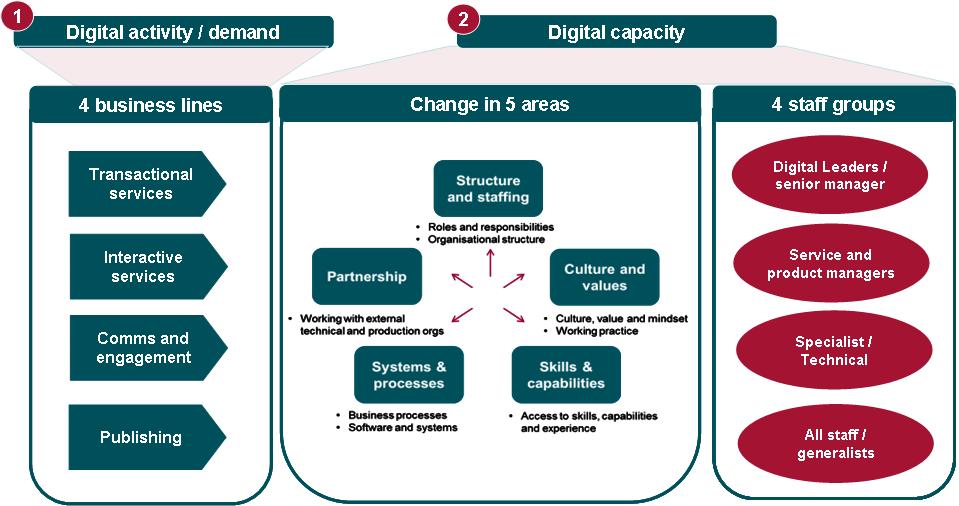There is growing interest in digital capability across government as departments look to implement their digital strategies.
The issue is critical for BIS given the number of arms length bodies (ALBs) involved in delivering digital services and using digital for engagement and policy making.
An update on the BIS Digital Capability review
Sharon previously blogged about our approach to the BIS Digital Capability review. The first phase of the review is now finished and we’ve reported back our findings and recommendations to ALB Chief Execs and the BIS Senior Management Team. I wanted to share our thinking so far.
To recap, we kicked off the review to:
- develop a clear view of digital requirements and capability across BIS and its agencies and ALBs
- understand the gaps in digital capacity, structural issues and barriers to change
- recommend a way forward including identifying areas for better collaboration
This work has been done in collaboration between the BIS Digital Transformation team, Rich and Josh at MTM London and digital leaders from the BIS ALBs.
Our analytical framework considers 4 main areas of business activity, 5 axes of change and 4 different staff groups:

There are 8 main findings which were derived from a mix of quantitative analysis (questionnaires sent to 35 BIS organisations) and follow up discussions with 10 organisations (including all the main service delivery organisations and representative other organisations).
What did we find out about digital capability?
1. Digital demand and resources vary hugely across organisations -- from Met Office at one extreme, through service delivery organisations with significant technical capability, to a long tail of organisations mainly doing digital communications and engagement.
2. In general, there is an inverse relationship between sophistication and confidence. The more organisations understand about customers’ expectations of digital, and the potential for digital business transformation, the clearer the organisational challenges become.
3. Most organisations are in transition to becoming digital by default: the strategic importance of digital is well understood but many are not yet continuously improving digital services based on a full understanding of customer needs.
4. There are leadership challenges in many organisations including the ‘ghettoisation’ of digital in ICT and a lack of experienced people able to lead digital as business transformation.
5. The separation of policy-making from service design and delivery can create major barriers to achieving digital by default services. Policy decisions sometimes restrict how delivery organisations can meet customer needs and exploit digital developments.
6. Legacy systems, contracts and issues with identity assurance can be significant technical constraints on organisations which will take time to overcome. Procurement and spending controls create additional burdens.
7. Access to specialist digital skills is a major challenge, with almost all organisations experiencing problems finding and retaining specialist staff and finding high quality suppliers due to market-level scarcity, government specific issues on procurement and pay and a lack of good supplier networks. Important gaps include people on the interfaces between technology and customers (e.g. customer insight, user experience design) and technology and the business (service and product managers).
What do we recommend doing?
These findings have led to 4 initial recommendations which we will be developing, trialling and rolling out over the next few months.
1. Provide support for CEOs and Digital Leaders involved in digital business transformation, potentially including mentoring, industrial tourism and bespoke support. Also, help CEOs answer the question “How do I know that my organisation is progressing well on digital in the areas that it should be?” by developing appropriate monitoring and governance frameworks.
2. Develop ways for BIS and ALBs to share knowledge, assets and resources for mutual benefit. This might include knowledge sharing clusters or themed seminars and workshops. We will also consider ways of sharing facilities and technologies and explore options for setting up a ‘resource bench’, where scarce technical and specialist resources are able to work on projects across the BIS network.
3. Address the barriers to accessing and managing specialist skills by helping organisations use new procurement frameworks and develop partner management strategies for identifying, selecting and working collaboratively with suppliers.
4. Develop a case for a central BIS ‘challenge and support’ function which could help with business cases and propositions, recruitment for key positions, monitoring and challenging progress and embedding digital good practice in other central-BIS teams (e.g. ALB sponsorship, finance, HR and procurement).
So what next?
Over the next few weeks we will carry out a discovery phase to better understand the user needs across each of the four recommendations and what is already out there that can help. We will also start to define the most important requirements. We will then do an alpha version, trialling approaches to each of the four recommendations with a small group of volunteer BIS organisations.
Until now the focus has mainly been on the specialist capability and capacity for delivering digital public services and this is reflected in our findings and recommendations to date. We will also develop our thinking about capability issues for digital engagement and policy making, with a greater focus on the core-department and general staff skills.
We'd be happy to discuss this in more detail with colleagues from other government departments and can share some of the tools we used.
Stay up-to-date by signing up for email alerts from this blog.
2 comments
Comment by Ian Glen posted on
Could I provide some specific feedback to the author?
Comment by Dan Sullivan posted on
Hi Ian. I've emailed you directly.